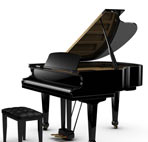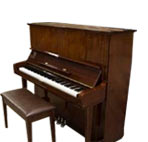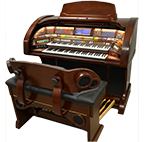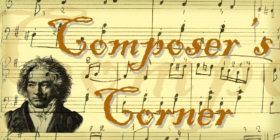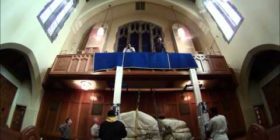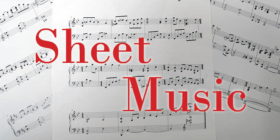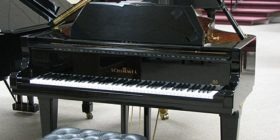THE NEW YORK TIMES: For years, the donated piano sat upright and unused in a corner of the nursing home’s cafeteria. Now and then someone would wheel or wobble over to pound out broken notes on the broken keys, but those out-of-tune interludes were rare. Day after surrendering day, the flawed piano remained mercifully silent.
Then came a new resident, a musician in his 80s with a touch of forgetfulness named Boyd Lee Dunlop, and he could play a little. Actually, he could play a lot, his bony fingers dancing the mad dance of improvised jazz in a way that evoked a long life’s all.
The lean times and the flush. The Saturday night hop and the Sunday morning hymn. Those long drives in a Packard to the next gig. That fine woman Adelaide, oh Adelaide, down in North Carolina. The deaths of a beloved aunt and a difficult marriage. Some things you don’t forget, so Mr. Dunlop keeps a white towel handy to wipe his eyes dry.
And so Mr. Dunlop would have remained, summoning transcendence from a damaged piano in the Delaware Nursing and Rehabilitation Center, his audience a couple of administrators, a few nurses and many patients beset with dementia, loneliness and age — were it not for a chance encounter and some cheesecake.
Instead, Boyd Lee Dunlop, 85, is the featured performer at a concert on Saturday night at the Hallwalls Contemporary Arts Center in downtown Buffalo. Admission is $10. And if you want to buy his debut CD, that will cost you another $15.
Sitting at Table 8, guarding the cafeteria piano beside him like a jealous lover, Mr. Dunlop accepts all of this with boastful humility. He thanks God for the talent, shares a few unprintable thoughts, and turns to play a soulful take of “Come Back to Sorrento.”
“I got to be Boyd,” he says, as aides scrape the remnants of pork fried rice from plastic dinner plates. “If I die Boyd, I’m still Boyd.”
Mr. Dunlop arrived at the brown-brick nursing home nearly four years ago, a strong-willed but slightly bent half-note. He had 50 cents in his pocket, too much sugar in his blood, and a need to be around others. He liked to sit in the lobby and greet people, especially the women.
After a while, Mr. Dunlop let it be known that he was a musician. This did not distinguish him in a place where someone might claim to be a retired concert violinist or President Obama’s mother, and, in the first case at least, be telling the truth. Also, music here usually meant something to be endured — the weekly sing-along, say, with a resident armed with his own electric keyboard.
The broken cafeteria piano was a tease that Mr. Dunlop could not resist. He played when no one else was around, between meals, early and late. He learned how to dodge the piano’s flaws, how to elongate the good notes and suffocate the bad.
Nothing like his music had been heard in these cleanser-scented halls. The sounds of Boyd, including the occasional yowl, would flow from the empty cafeteria to greet Kate Wannemacher, the director of nursing, as she arrived early in the morning. “He plays right out of his heart,” she says.
Life kept time to a nursing home’s beat. Breakfast lunch dinner, breakfast lunch dinner, with occasional riffs of bingo, sing-alongs, insulin shots, paranoia, and more bingo. Mr. Dunlop had his bellicose moments, but mostly he was charming away in the lobby or, more likely, entranced by the cafeteria piano.
Then came that chance encounter.
In the spring of 2010, a freelance photographer named Brendan Bannon arrived to discuss an art project with nursing home administrators — and Mr. Dunlop greeted him at the door. Mr. Bannon is balding, so Mr. Dunlop assumed for some reason that he was a doctor. “Hey doc!” he shouted. “Take my temperature.”
A bond quickly developed, and before long Mr. Dunlop invited his new friend to hear him play what he referred to as “that thing they call a piano.” Mr. Bannon, who knows his Mingus from his Monk, could not believe the distinctive, vital music emanating from a tapped-out piano missing a few keys.
“He was a beautiful player,” Mr. Bannon says. “He was making it work even though it was out of tune.”
Now for the cheesecake.
Sensing Mr. Dunlop’s growing frustration with the damaged piano, two nursing managers, Pete Amodeo and Sue Cercone, came up with an idea: a bake sale. He made several Italian cheesecakes, she baked some cookies and other staff members helped out to raise more than $100 — enough to pay for a visit by Vinny Tagliarino, a blind piano tuner.
The tuner healed the piano. “And that moved me,” Mr. Dunlop says, which means his white towel got a good workout that day. “The notes by themselves — they were sharp.”
The crisp sounds now rising from the cafeteria’s corner, that haunting take on “The Man I Love,” were so distinctive that Mr. Bannon sent cellphone recordings to his childhood friend Allen Farmelo, now a music producer in New York. His question: Is this any good?
What Mr. Farmelo heard were snippets from the ongoing composition of a black man who was born poor in Winston-Salem and raised poor on Buffalo’s East Side. Whose mother cleaned houses and whose father is mostly clean from memory. Whose younger brother, Frankie, would become a world-famous jazz drummer whose work is featured in more than 100 recordings.
Young Boyd found his own calling in a discarded piano in a neighbor’s backyard (“I got to play you!” he remembers thinking). He learned his chords from a Czerny guide and took five lessons from a local teacher. By 15 he was playing in church and in a downtown nightclub, where crowds came to listen and prostitutes chipped in to buy him a new suit.
He was cocky, but then the great, lightning-fast Art Tatum stopped at the house while passing through Buffalo to hear the kid, drink some beer, and play a little. “So many keys being sounded off at one time,” Mr. Dunlop recalls, awed still, partly because Tatum could play with a beer bottle in one hand.
Mr. Dunlop played in the Army, he played in long-gone Buffalo nightclubs, he played after his shift at Bethlehem Steel, the soot coming off his hands to stain the ivory. Then, after a gut-check moment — “What am I doing here?” — he decided to play full-time, traveling to New York, Chicago, Los Angeles.
“Mr. Boyd, you have to get your insulin,” interrupts a young nurse, Portia Pratt, who jokes that she loves to hear him play because it means he’s still alive.
“There’s my girlfriend,” Mr. Dunlop shouts. “Stick it in!”
Seattle, with Big Jay McNeely. Green Bay, Wis., where he won a $500 bet with a customer who said he couldn’t play 50 songs the customer named. Above and below the Mason-Dixon line, where he didn’t take kindly to being called the n-word. Outside Jonesville, N.C., where Adelaide worked as a waitress: “The way she walked, the way she moved. She glided! ‘Oh God, can I glide with you?’ ”
All this was in the music Mr. Farmelo heard. The daughters. The broken marriage. The gunshot wound inflicted by a nephew. Church. Diabetes. Old age. “Come Back to Sorrento.”
“I was pretty blown away,” Mr. Farmelo says.
So, in late February, Mr. Bannon and Mr. Farmelo rented a recording studio and hired two first-rate musicians: the drummer Virgil Day and the bassist Sabu Adeyola, who knew Mr. Dunlop from the still-open Colored Musicians Club in downtown Buffalo. When Mr. Dunlop arrived for the session, he didn’t even take off his coat. He went right to the Steinway, and started to play a riff that would become part of the CD, called “Boyd’s Blues.”
“What I remember is how happy he was,” Mr. Adeyola says. “How extremely happy he was.”
At the nursing home the other day, the remains of another chicken lunch were scraped from plastic plates, and another round of bingo was played. But not for Boyd Lee Dunlop.
He put on a black winter coat over the shirt and sweatpants he’s been wearing for days, walked past an honor guard of wheelchairs, and headed for the door. He had to get to rehearsal, for that gig he’s got Saturday night.


